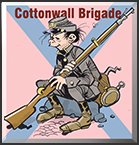Bullwinkle58
Posts: 11302
Joined: 2/24/2009
Status: offline

|
quote:
ORIGINAL: mind_messing
quote:
ORIGINAL: Bullwinkle58
quote:
ORIGINAL: mind_messing
In all fairness, I don't think anybody really understood how different the diplomatic game had became, not just the Europeans.
It all comes back to the demand for unconditional surrender. It had advantages and disadvantages, and one of the big disadvantages was that the Japanese had nothing to gain by giving up.
Churchill's questioning Truman at Potsdam shows that even by August 1945 he, the leader of the Empire, still looked at diplomacy in the "old way." Truman's view was much more linear and visceral. It reflected the POV of the US citizenry. Read a lot of the US media in those years if you want examples.
That is a very good point. The "traditional" conduct of wars in Europe were fought until it was evident that one side had a clear advantage and was going to win, at which point the losing side gave up and tried to hack out some terms. Even WW1 was not an exception to this, though the Central Powers were excluded from talks.
You don't see the same with the Pacific War - it's not until after the fall of Saipan that the Japanese recognized even the possibility of defeat, and not till 1945 for the Japanese government to realize that defeat was a certainty.
quote:
My point was Europeans did not enter WWII, or any war in the past 300 years I can think of (tell me if I'm wrong), in the same or similar way the US entered WWII.
That depends on your opinion of who sunk the USS Maine. :)
quote:
What did Japan have to gain by giving up? Their lives. If they didn't value them in a Western way that's a shame, but the US was prepared if it came to it to extinguish them root and branch. At great cost to be sure, but no less the case. Again, not sure something Europeans, with their history of ebbs and flows, can grasp. If Vienna had fallen to the Mongols you guys might, but then again we wouldn't be having this conversation if Vienna had fallen. Maybe talk to the ghosts of Babylon's residents?
Again, another good point. We tend to view the war from a Western perspective, which (even now) treats large numbers of casualties quite differently from that of the Asian perspective.
It's an interesting difference in perspective that is a recurring theme, not just with the Japanese. It re-appears again in the Chinese Civil war, Korea, and in Vietnam.
To your good inputs I would add this: look at the relative ages of the two WWII society groups, US and Europe-in-general. The president and many of the US flag officers had been born either on the frontier or in the immediate post-Civil War era. Their fathers and grandfathers were CW veterans to a great extent. Their childhoods had seen the end of the wars against the American Indian, wars which in some cases had a genocidal tone. They were rough men in ways European officers and politicians were not. They were educated and they were smart, but they didn't come from the same cloth. We were and still are a young nation. We were and still are a more violent nation than the European homelands many of us claim.
That's why I say Truman was more linear and more visceral. After Lincoln he is in my view our greatest president. A great deal of his effectiveness came from being a leader first and a politician far behind that. We could have done far worse having someone else oppose Stalin. I think the two of them understood the other, even if they didn't like each other.
_____________________________
The Moose
|
 Printable Version
Printable Version
















 Wracking my brain for European dates that fit "July 12th" and "November 9th."
Wracking my brain for European dates that fit "July 12th" and "November 9th."

 New Messages
New Messages No New Messages
No New Messages Hot Topic w/ New Messages
Hot Topic w/ New Messages Hot Topic w/o New Messages
Hot Topic w/o New Messages Locked w/ New Messages
Locked w/ New Messages Locked w/o New Messages
Locked w/o New Messages Post New Thread
Post New Thread